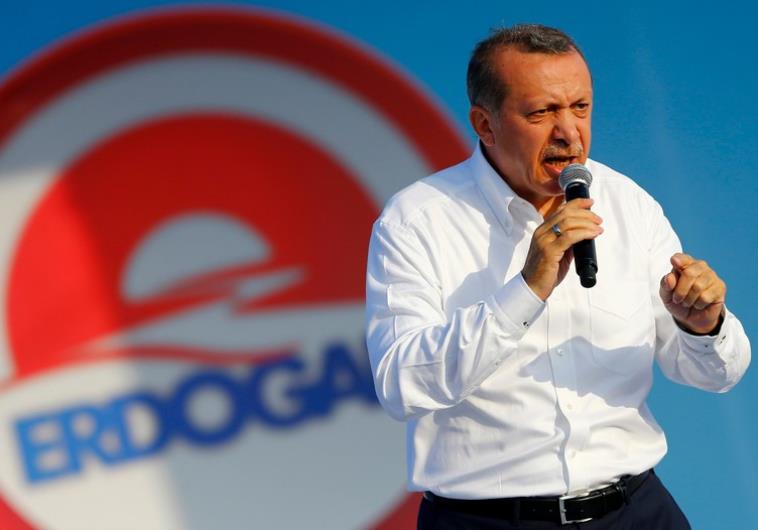Is Turkey heading for a train wreck with the West?
By ARIEL BEN SOLOMON \ 11/14/2014/Jerusalem Post
Turkey’s foreign policy is becoming more aggressively Islamist by the day. How far can it go before it ruins its relationship with the West? Or perhaps the question should be, what would Turkey have to do to get kicked out of NATO? Quite a lot, it turns out.
Ankara is set to take over the presidency of the G20 next month, and aims to use the opportunity to promote its image as a global economic power and assuage its self-image as a country increasingly isolated on the world stage and buffeted by conflict on its southern frontiers.
According to a Pew Research Center poll released in July, only 19 percent of Turks view the US positively, and 25% feel that way about the EU.
Moreover, seven in 10 Turks have an unfavorable view of NATO.
“The problem is that NATO has no mechanism to kick out a member,” Michael Rubin, a scholar at the American Enterprise Institute and a former Pentagon official, told The Jerusalem Post on Thursday.
“Countries have withdrawn before, of course, but once NATO allows a country in, it’s stuck with it,” he said. “No one expected that any NATO member would change direction so radically.”
“Even if [President Recep Tayyip] Erdogan swore allegiance to al-Qaida tomorrow – NATO wouldn’t have any mechanism to expel him short of dissolving the alliance entirely,” said Rubin.
Since the Turkish people gave Erdogan and his Islamist AK Party a first-round victory in the presidential election in August, he has increasingly become dictatorial, clamping down on the press and the Internet, and weeding out his opponents in the police, military and the prosecutor’s office.
As Erdogan has consolidated power at home, he has had a freer hand to act abroad.
Ankara has been reluctant to play a frontline role in the US-led military coalition. US officials have said Turkey’s open border policy with Syria helped allow radical groups to grow there.
Libya has descended into chaos three years after the toppling of strongman Muammar Gaddafi, with warring factions battling for control and the capital Tripoli currently run by an alternative government partly backed by Islamist groups.
Turkey’s appointment last month of a special representative to Libya, who became the first envoy publicly to meet with the internationally unrecognized authorities in Tripoli, is part of Ankara’s efforts to promote UN-backed peace negotiations, according to senior Turkish officials.
Unless NATO comes up with a mechanism to expel or suspend members, the whole alliance could be at risk,” said Rubin. “It could go the way of CENTO, the Central Treaty Organization, which also counted Turkey as a member, but couldn’t survive the 1979 Islamic Revolution in Iran.”
“NATO governance by consensus was one of those things that looked good on paper but doesn’t work well in reality,” asserted Rubin. “It is the Trojan Horse all over again. Turkey can do far more harm from the inside than outside, but NATO is too paralyzed to do much about it.”
And the release on Thursday of 12 Turkish nationalists detained after an attack on US sailors in Istanbul can only increase tensions. The men could still face charges for causing insult and injury.
They assaulted three sailors on a crowded street in Istanbul on Wednesday, shouting “Yankee go home,” throwing paint and trying to pull hoods over the Americans’ heads.
The group, members of the Turkish Youth Union (TGB), were told they faced possible charges of insult, injury and breaching laws on public protests in an Istanbul court before being released by the prosecutor, the Dogan News Agency (DHA) said.
The Pentagon said shore leave had been canceled for servicemen from the US Navy guided-missile destroyer, the USS Ross, which was expected to leave Istanbul on Thursday.
The Turkish Foreign Ministry condemned the attack, branding it disrespectful and “impossible to view with tolerance.”
“Turkey’s population has displayed for many years anti-American feelings. The US will downplay the recent incident in Istanbul,” Prof. Efraim Inbar, director of the Begin-Sadat Center for Strategic Studies at Bar-Ilan University, told the Post.
“The US actually mulls changing strategy in Syria – going after [President] Bashar Assad – to please the Turks and enlist their support against Islamic State,” he said. “Obama’s Washington still sees Turkey as an indispensable ally.”
Mustafa Akyol, a Turkish columnist for Hurriyet and a regular contributor to The International New York Times, told the Post on Thursday that “although most Islamists in Turkey dislike the US, these aggressors were not Islamists, but secular nationalists.”
Those that attacked the US sailors represent “a strident synthesis of Kemalism, the ideology of Mustafa Kemal Ataturk, and ‘anti-imperialist’ leftism, which has its roots in the upsurge of Turkish Marxism in the ’60s,” explained Akyol.
“In their mind, they were taking the revenge of the ‘hood incident’ of 2003, when some Turkish soldiers in Iraq were arrested by US soldiers,” he said.
Reuters contributed to this report.




















